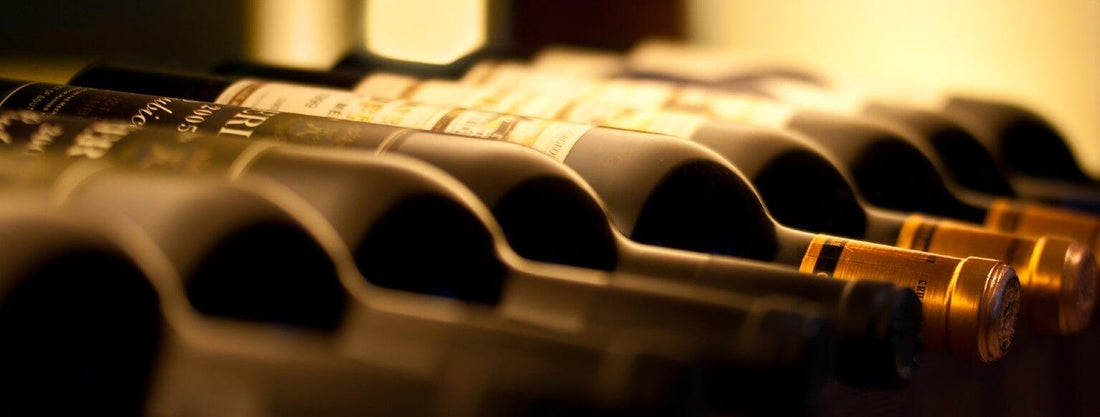Wine enthusiasts know that proper storage is key to preserving the quality and taste of a wine. But what exactly does that entail? From temperature control to light exposure, there are several factors to consider when it comes to wine storage. In this ultimate guide to wine storage, we'll cover everything you need to know about wine storage. Plus, we'll share some tips for ageing your wine collection like a pro. So pour yourself a glass and read on!
Why Proper Wine Storage is Important
Proper wine storage is a crucial aspect that can enhance the flavour and quality of wine over time. Temperature control plays a vital role in the wine's ageing process, as fluctuations in temperature can damage the wine, causing it to spoil or oxidize. Wine should be stored at a consistent temperature, ideally between 45-65°F. Humidity levels should also be monitored to prevent corks from drying out or mould from forming.
Wine bottles should be stored on their side to keep the cork moist and prevent air from entering the bottle. This is because when corks dry out, they allow air to enter, which can affect the taste of the wine. Those who are serious about wine storage should consider investing in a specialized unit such as a wine fridge or professional storage unit, where optimal conditions can be maintained, ensuring that every bottle is stored safely and correctly for long-term ageing.
Factors to Consider When Choosing Wine Storage
When it comes to wine storage, there are several factors to consider. One of the most important factors is temperature - wine should be stored at a consistent temperature and humidity level. Wine should also be stored in a dark place where light can't penetrate as it can cause oxidation and spoilage. Another important aspect is movement – you should keep your wine stable and free from vibration to avoid any sediment disturbance.
Finally, you need to consider the size and capacity of the storage space based on how much wine you plan to store. Taking these factors into account can help ensure that your wine stays in optimal condition for as long as possible.
Temperature Control
Temperature control is one of the most important factors to consider when choosing a wine storage space. It's recommended to store wine at a consistent temperature between 45-65°F to prevent spoilage and ensure optimal ageing. Investing in a wine cooler or cellar can help maintain the optimal temperature for wine storage.
Avoid storing wine in places where temperatures can fluctuate frequently, such as near windows or air conditioning vents. These fluctuations can cause the cork to expand and contract, allowing air into the bottle and causing the wine to spoil. By prioritizing temperature control, you can ensure that your wine stays in great condition for years to come.
Humidity
Humidity plays a crucial role in ensuring the quality and longevity of your wine. The ideal humidity range for wine storage is between 50-70%, as this helps keep the cork moist and prevents air from entering the bottle. Low humidity can dry out the cork, which can lead to oxidation and spoilage of the wine.
On the other hand, high humidity levels can promote mould growth on the cork, affecting both the appearance and taste of the wine. To maintain optimal humidity levels for your wine storage, consider using a humidifier or dehumidifier depending on the rooms humidity level. By taking these steps to, you can be sure that your wine will stay fresh and delicious for years to come.
Light Exposure
Another critical factor is light exposure, as direct sunlight and UV rays can cause premature ageing and result in a loss of flavour and aroma. To ensure proper ageing, wine should be stored in a dark, cool place with minimal light exposure. If storing wine in an area with windows or natural light, consider using tinted glass or curtains to block out harmful UV rays.
Another option is investing in a wine fridge with UV-protected glass, which can provide optimal conditions for storing your wine collection. If you can minimize light exposure, you will protect the integrity and quality of your wine collection.
Ventilation
Lastly, it’s important to consider proper ventilation. Wine needs a constant flow of fresh air to prevent mould and mildew growth, which can negatively impact the quality of the wine. A well-ventilated wine storage area will also help regulate temperature and humidity levels, ensuring optimal conditions for your wine.
It's important to ensure that the ventilation system is not too strong, as this can cause the wine to age faster than intended. To determine the appropriate amount of space needed for ventilation, a good rule of thumb is to provide at least one cubic foot of space per case of wine in your storage unit.
Tips for Wine Storage & Ageing
Proper wine storage is crucial to maintaining the quality and taste of wines. As discussed, wine should be stored at a consistent temperature and humidity, away from direct sunlight or fluorescent lighting and in a well ventilated area. You should also store bottles horizontally rather than vertically as it keeps the cork moist and prevents oxygen from entering the bottle.
It is also essential to consider wine ageing potential when storing different types of wines. Red wines typically age better than white & rosé wines, with some red wines needing several years of ageing to reach their peak flavour. Therefore, proper wine storage techniques are necessary for optimal flavour development over time.
Keep Bottles Horizontal
It’s important is to store wine bottles horizontally as this helps to keep the cork moist and prevents it from drying out, which can lead to air entering the bottle and spoiling the wine. To store wine bottles horizontally, it's best to use a wine rack or storage unit specifically designed for this purpose. These storage solutions ensure that bottles stay in the correct position and do not move around.
Rotate The Bottles
Another important practice is rotating your wine bottles every few months. This helps to ensure even ageing and prevents sediment build-up, which is especially important for wines that are stored for longer periods. Additionally, rotating your wines allows you to keep track of which bottles should be consumed sooner rather than later.
Don't Move the Bottles Too Much
You should also avoid moving the bottles too much, as this can disturb the sediment and negatively impact the flavour of the wine. When rotating your wine, try to do so with a little movement to the bottle as possible.
Keep A Record of Your Collection
When it comes to wine storage and ageing, keeping a record of your collection is essential. It can help you keep track of which wines should be consumed first and which ones should be aged longer. Additionally, maintaining a record can help you remember important information about each wine, such as its vintage and tasting notes.
There are many tools available for keeping a wine collection record, including mobile apps and specialized software. Another benefit of keeping a record is that it helps you avoid purchasing duplicate bottles or overlooking wines that need to be consumed sooner rather than later.
Conclusion
Proper wine storage is crucial in preserving the quality and taste of your favourite wines. Temperature control, humidity, light exposure, and ventilation are all essential factors to consider when choosing a wine storage option. Once you have chosen the right location and prepared the space for wine storage, make sure to store your bottles properly by keeping them horizontal, rotating them regularly and keeping them still. If you're an avid collector, it's also important to keep a record of your collection. Follow these tips for successful wine storage and ageing, and enjoy your favourite wines at their best.



